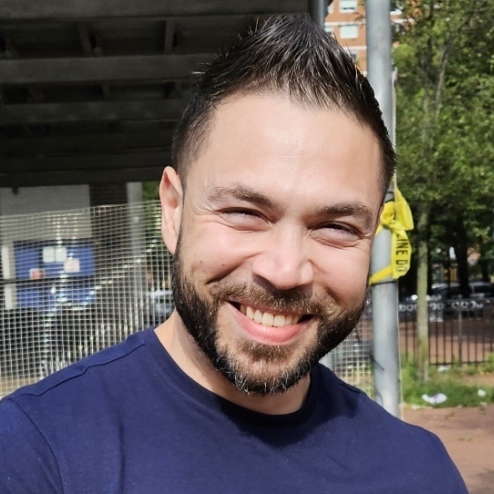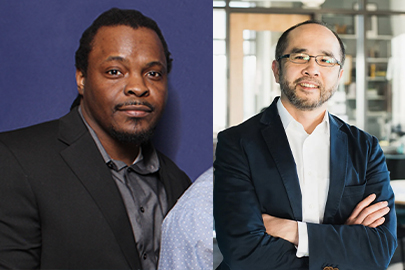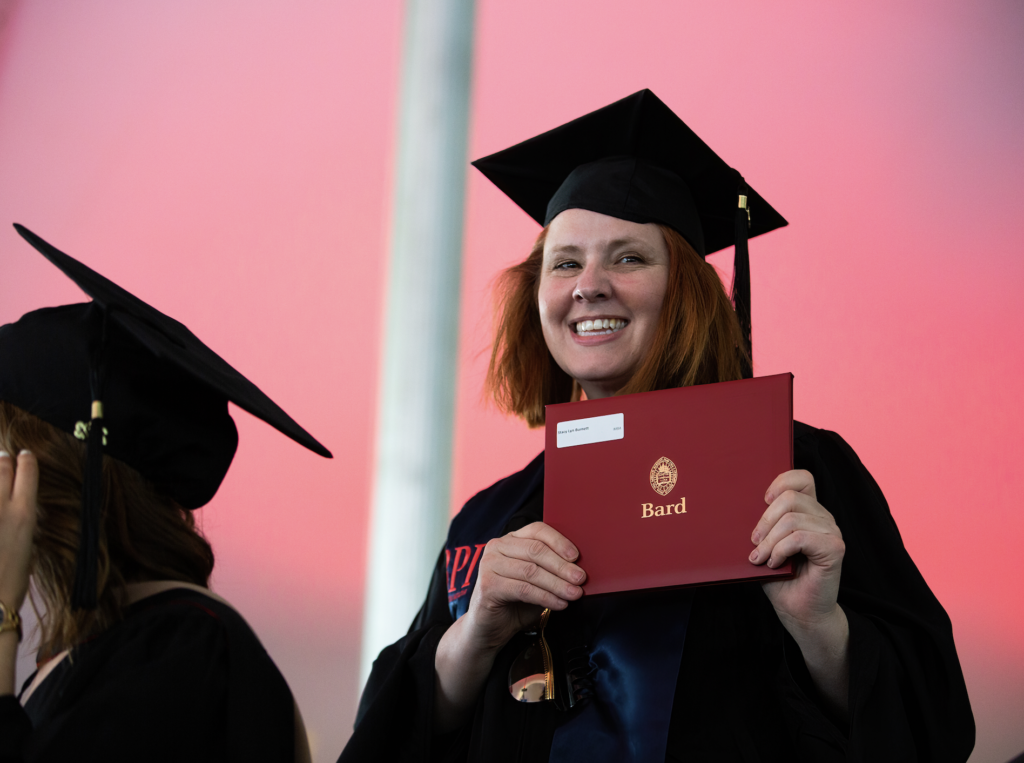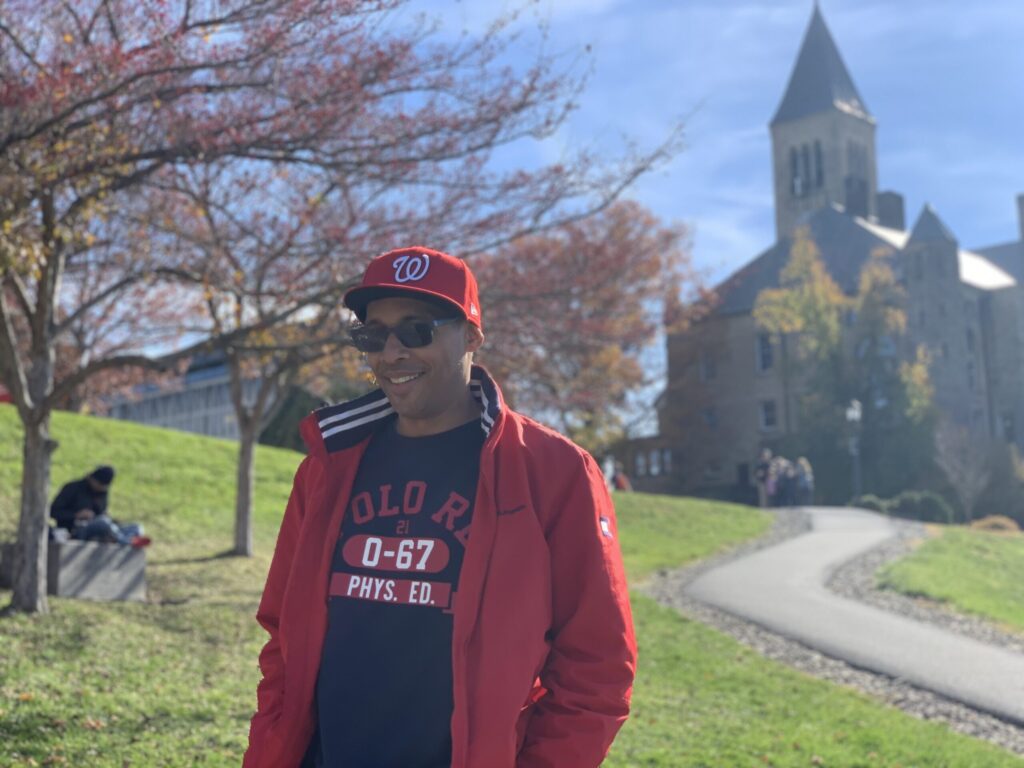BPI alumnus Alex Hall (’17) authored an essay describing the societal and personal value of a rigorous liberal arts education in the series Education Against All Odds. The full essay, reproduced below, can also be found on David Bryne’s Reasons to be Cheerful website here. Hall works as a Housing Associate for BPI, assisting returning alumni with their transitional and affordable housing needs. This is his first publication.
I’m Not That Guy Anymore
I hated school—until I got slapped with a 15-year prison sentence and discovered calculus, Mandarin and the college degree I never knew I wanted.
Most people agree that we need education. Public education in particular is thought to be the “great equalizer” in free societies, ensuring an equal chance of success to everyone. In a democracy, what could be more important? But there’s something that most people leave out: not all education is created equal. Real education is not just about school or a core curriculum. It doesn’t just teach you what to think, but how to think—and how to keep thinking for the rest of your life.
I understand the difference between the effective and the ineffective kinds of education more intimately than many.
I understand because I received both types—a public school education that was uninspiring and a college education that changed my life. I went from hating school as an adolescent to loving it as an adult. And my path from public education to private college tells the story of the power that education, done right, can have—even in the darkest of places. Because here’s the twist: when I finally did encounter this real education, I was five years into a 15-year sentence in state prison.
Do I have your attention now?
Good, and hang in there because the beginning of this story is rather uneventful. It is, unfortunately, a typical public school story.
Isolated and inapplicable
You see, school had seemed fine to me up until about the eighth grade. But by the time I hit middle school, things had changed. I learned quickly that school was boring, life was fun, and that Wagner, MS 167, was so big that no one really cared if I showed up. So I didn’t. I cut classes, stopped doing homework and failed nearly all of my classes by midterm. I got in some trouble for that, so I learned how to do the absolute least amount of work necessary to pass… and avoid the wrath of my mom.
I graduated from high school on time, surprisingly, but the classwork never engaged me. And college was like déjà vu, as though the state university I attended had developed its pedagogical approaches from the same manuals my public schools had: isolated and inapplicable to the life I lived outside. It seemed pointless to me to memorize formulas that I thought had no relationship to the real world. College only lasted one semester for me.
Working a few dead end jobs and hanging out partying ate up about three years after that. Being liked, fun and a little crazy gave me a reputation I didn’t mind having. I was 21 and didn’t worry much about the future. But that ended in 2005 after a bad party, a bad fight, a gun and a train of terrible decisions that I can never take back.
Things I wish my old self had known
My life and the lives of many other people changed dramatically amid this tragedy. But this is also where my relationship with education changed. The moment I realized I was going to prison, I suddenly wanted to go back to college. It felt like I had let so many people down, my family in particular, that I needed some form of redemption. School seemed like the answer. I wanted to show my family—perhaps also myself— that I still had value. It took me five years to get there, but at age 26 I finally had a chance to apply to Bard College’s Prison Initiative (BPI) at Eastern Correctional Facility. The application process was competitive, scary and uncertain. After weeks of waiting, I was ecstatic when I received an acceptance letter.
I was determined, but I was also surprised: this was not how I remembered school. Sure, my drive was different, but the courses I encountered were also complex and interesting. They seemed to put words to so many things I had experienced, especially in my adolescence.
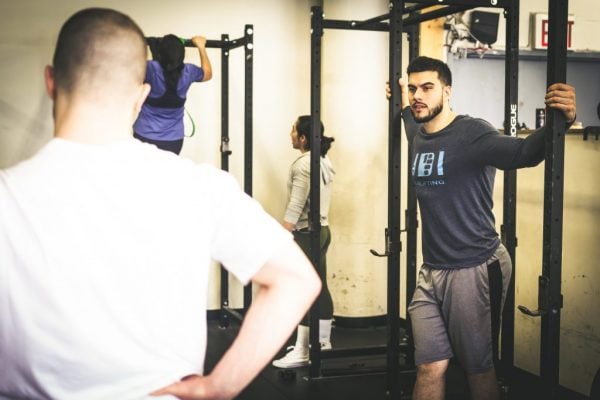
Alexander Hall with one of his clients. Released from prison in 2018, Alex now works as a strength coach at a gym he co-owns in Long Island City.
For example, my first year composition class gave me texts about peer pressure and group minds that helped me understand why I had followed the people I had in my youth, even when I knew deep down that those people were setting poor examples for me. One of my first thoughts was, “damn, these are things I wish my 14- or 15-year-old self had known.”
Anthropology gave me new perspectives on identity, something I struggled with, and gave me a vocabulary to speak up about concepts like hegemony. These were things I had dealt with daily, in prison perhaps more visibly, but in my life outside as well. BPI made me engage with these concepts. And the most crucial thing was that nothing was free. I had to work and to think like I had never worked or thought before because my ideas were heavily scrutinized by my professors. My thinking was constantly being examined. My critical eye came alive in those years as did my ability and my need to question. My favorite question became: “why?” The person I was for so many years, who acted without thinking, was slowly fading away, and I liked it.
Why had school not always been like this? I’d had such disdain for school in the past, yet all of a sudden, I was interested, intrigued, captivated. I plowed through 120 credits of coursework— classes like America’s Right Turn; Middle Eastern Modernities; Race, Religion and Nation; not to mention an entire calculus sequence, Mandarin Chinese, and a yearlong, hundred-page thesis (111, but who’s counting) on progressive methods of education.
The rough ride I had taken through both school and life made the importance of my newfound passion for education that much more significant. As I wrote my thesis, I came to understand how my personal troubles and the flaws of the public education system had intersected. I spent a year excavating the history, research, bureaucracy and debates about education in America. In the wake of my thesis, I often feel like I understand the current administration’s draw toward school privatization more deeply than they do. This is not to boast, but to say that I am an informed citizen who can assess and engage a debate about education reform. That is something I am proud of.
I exist in a paradox
Witnessing in myself and in the other students the academic growth necessary to complete something like a thesis was powerful and empowering. Just hearing about the prospect of a senior project from the beginning of one’s entrance to the college adds an aura of significance to the process. It made me nervous, but it also made me feel more academically capable than I ever had because my professors never questioned my ability to complete it. It was a given to them that I could, and would. I liked that. It crossed my mind for the first time that I may actually be able to hang with the big boys, to complete the kinds of projects that students from Ivy League schools were doing. This kind of hope is especially important for someone in prison.
Specific, intense study has other side effects too. Through my research, I learned more about American history, and about citizenship and government—all topics that bolster my value as a community member and as a partner in conversation, depending on whom you ask. But even more so, the journey that I took to complete that thesis proved to me that I am capable of dealing with any subject in that much depth. I need only apply the effort. This kind of intellectual confidence goes far beyond the walls of the school or the prison. It is preparation for life.
And yet, I also realize that I exist in a paradox.
When I talk about the power of education, when I claim with such force that education is transformative, and when I stress the importance of things like critical engagement and independent thought, I do so from a position of privilege—regardless of my social position.
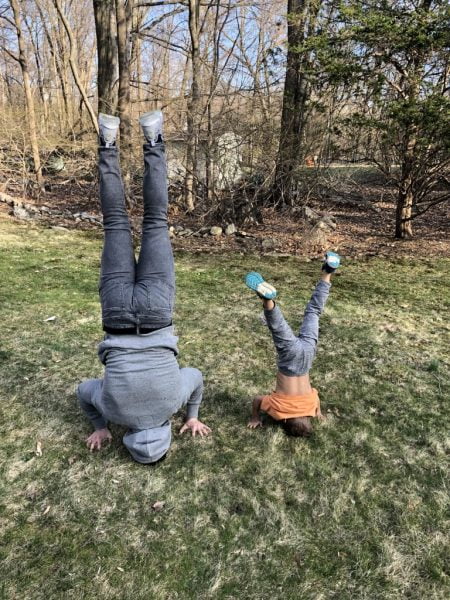
Alex in his mother’s yard, playing with his nephew in spring, 2019
I understand the value of education because I received an elite education. By an elite education, I mean a liberal arts education. I call it elite because the liberal arts have traditionally been reserved for the wealthy who possess the time and money to engage in four or five years of non-specialized study. I shared in this privilege because my education was paid in full, and I was able to spend my college years without the burdens of working a job or accumulating any student debt. This is, no doubt, a privileged position to hold in American society.
My encounter with this elite education happened in prison, sure. And while prison is not a place one would normally associate with elite status, the social experiment of BPI is just that: duplicating an elite experience for not-so-elite populations to show the inherent value of a liberal arts education.
Now make no mistake, life in prison does not stop when a person enters BPI. There are still prison guards, rules, bars, and walls to deal with. When the prison guards set up a security checkpoint, it doesn’t exclude Bard students. I still had to strip naked after every single trip to the visiting room, after I graduated with my AA, my BA, and even after I defeated West Point in a debate. None of it was easy.
And yet, something important was able to happen in that space: the experience of being able to engage intensely with course work without the burdens of real life placed us in a similar sort of bubble that college campuses have traditionally formed for privileged students. As such, I realize that I share this educational experience with very few people in the world, even people who attended respectable schools. And perhaps that’s why the passion I have developed for education is not widely held.
A friend of mine who attended a state college in California told me that college should “skip the whole community, campus interaction thing and get right to job training. People have degrees in philosophy, $250,000 in debt and can’t get a job.” His argument was to make college short and precise, which is something that many people agree with—spend less time worrying about free thinking, community involvement and extracurricular activities and give students the skills they need to get to work.
I couldn’t disagree more. I know that is a very privileged position to be able to take, but I also know how much more complex my thinking became when I engaged critically with the coursework at BPI. I revised my own thinking and ingrained biases, even the previously subconscious ones. I discovered a world and a history that I belonged to and began to better understand my place in it. I became a thinker and a community member, two things I had not been so good at. I feel deeply that my education made me more than an efficient worker—it gave me the tools to be a better neighbor, a better friend, a better human being and, yes, as a side effect, more employable.
I am a rule
I want to live in a place where people are connected to their history; where they think about the effects of their actions and work to improve the places they live. It is a utopian goal, but only because society is structured in a way that limits access to the type of privileged education I received. Had I been bogged down with debt, working to pay off loans, or engaging with all of the other problems of life, the value of my education may have remained elusive.
New York may be onto something by providing free tuition at City Universities. But doing so only solves one of the many problems that exist in the system of higher education. It says nothing to the lack of academic communities, academic supports, quality teachers and intriguing curricula.
More must be done. And the question is really one of purpose. What is education for, and what kinds of people or citizens are we trying to produce? If we genuinely want thoughtful people in our society, ones who can make educated decisions for themselves and their communities, then the answer to what education must look like is clear.
I am proof of the transformative power of a quality education, and I am not an exception. I’m a rule—a rule that has been hoarded by the privileged few for far too long.
Also in this collection: scholar Ellen Condliffe Lagemann’s piece on the evidence behind the Bard Prison Initiative.
